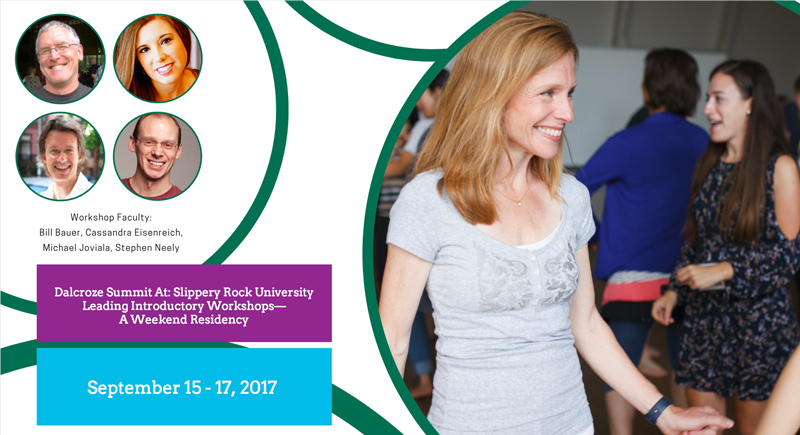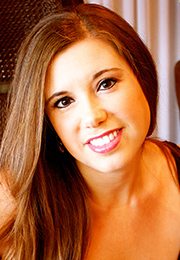SRU hosts Dalcroze workshop September 16

The Dalcroze Summit at Slippery Rock University, Sept. 15-17, will include movement games, improvisation, pedagogy, application and a children's demonstration class.
Sept. 14, 2017
SLIPPERY ROCK, Pa. - While the term "dalcroze eurhythmics" may cause some head scratching among the masses, to those in the music education community, the words bear the weight of the entire industry.

EISENREICH
That weight will bear down on Slippery Rock University beginning at 9 a.m., Sept. 16 when Cassandra Eisenreich, SRU instructor of music education and performance, cohosts a Dalcroze workshop for music therapists, educators, students and performers at Swope Music Hall.
The workshop will include movement games, improvisation, pedagogy, application and a children's demonstration class.
Dalcroze eurhythmics is a process for awakening, developing and refining innate musicality through rhythmic movement, ear-training and improvisation. The Dalcroze method is a unique approach to music learning developed in the early 1900s by the Swiss composer and educator Emile Jaques-Dalcroze where students are taught to focus on physical awareness in order to experience music through their natural senses. "This workshop is certainly a very big deal and we're very excited about it," said Eisenreich. "It's a pretty comprehensive experience for one day."
The program will open with the children's movement class led by Michael Joviala, Dalcroze instructor at the Lucy Moses School in New York. "We are inviting preschool students and their families from the community to join us," said Eisenreich. "Immediately afterward, we will reflect on what was observed during the class and how we can use that to benefit our teaching and therapy positions."
Stephen Neely, instructor of eurhythmics at Carnegie Mellon University, will then provide participants with instruction in a basic eurhythmics course.
According to Eisenreich, that portion of the workshop will feature lots of moving and interacting as eurhythmics is all about developing a sense of attention, concentration, social integration and nuance. "We'll be doing activities that are a real mix of those four experiences," Eisenreich said. "This will be a real contrast to those classes where you walk in, sit at a desk and work alone."
At 11:30 a.m., Eisenreich will initiate a session of reflection, allowing participants to discuss how the movement games and improvisation they've learned can be utilized in their current workplaces and classes.
"Doing this reflection is especially important," said Eisenreich. "What's so beautiful about eurhythmics class is you don't want to stop and take notes. You're constantly involved in the moment, and when stop to take notes, you kind of leave the mindset that you're in."
Lunchtime discussion will allow participants to learn more about the history and meaning behind dalcroze and eurhythmics before giving way to Bill Bauer, president of the Dalcroze Society of America. Bauer's session will concentrate on transferring one's voice to an instrument of choice, a process rooted in instrumental improvisation.
"For music educators, therapists and performers, improvisation is an important aspect," said Eisenreich. "We're not just reading from a script, so it's a powerful session to have and certainly one that is welcomed in every music field."
Breakout sessions led by SRU faculty members Nicole Hahna, assistant professor of music, and Vern Miller, instructor of music, will conclude the program.
MEDIA CONTACT: Maizee Zaccone | 724.738.2091 | mxz1016@sru.edu

